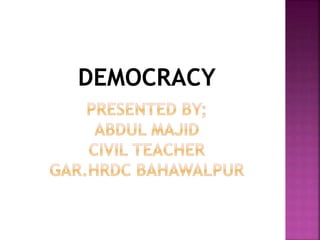
Understanding Democracy: Concepts, Types, Models and Issues
- 1. DEMOCRACY
- 2. Learning outcomes for people • Understanding the concepts of democracy • How democracy makes impacts on people • Understand the different political parties Democracy
- 3. WHATS DEMOCRACY IT`S TYPES CLASSICAL THOERY IMPORTANT EVENTS INGREDIENTS OF DEMOCRACY VEHICLES AND TOOLS OF DEMOCRACY MODELS OF DEMOCRACY SUCCESSFUL DEMOCRACY GLOBALIZATION TYPES OF GOVERNMENTS ISSUES and DISCUSSIONS
- 4. “Democracy is a political form of government carried out either directly by the people (direct democracy) or by means of elected representatives of the people (representative democracy). The term comes from the Greek: δημοκρατία - (dēmokratía) "rule of the people", which was coined from δῆμος (dêmos) "people" and κράτος (krátos) "power", in the middle of the fifth-fourth century BC to denote the political systems then existing in some Greek city-states, notably Athens following a popular uprising in 508 BC.
- 5. Even though there is no, universally accepted specific definition of 'democracy', Equality and freedom have been identified as important characteristics of democracy since ancient times. Principles are reflected in all citizens being equal before the law and having equal access to power. For example, in a representative democracy, every vote has equal weight No restrictions can apply to anyone wanting to become a representative.
- 6. Parliamentary Democracy An elected group of people that makes laws; often, power is shared among several political parties Federal Republic Allows shared power among national and local authorities
- 7. The triple meaning: Democracy as source of state authority – power of the people Democracy as the purpose of government – the common good Democracy as a method of choosing political leaders – by the people Abraham Lincoln: “Government of the people, by the people, and for the people” (1863) Also from Lincoln (1861): “This country, with its institutions, belongs to the people who inhabit it. Whenever they shall grow weary of the existing government, they can exercise their constitutional right of amending it, or their revolutionary right to dismember or overthrow it”.
- 8. Death of Socrates: Plato blames democracy [399BC] Magna Carta 1215 Glorious Revolution 1688 American Revolution 1776 French Revolution 1789
- 9. Russian revolution 1917 Chinese protracted revolution Globalisation United Nations European Union
- 10. Freedom (of thought, believe, expression, Speech, Debate, Inquiry, assembly, association, legitimate profession, movement…) Citizen’s Rights ( Human, political and civic…) Majority not majoritarism (Majority rule with the protection of minority rights and participatory decision making) Accountability (parliamentary or democratic ways not through discriminatory undemocratic ways like NAB in Pakistan) Transparency ( Access to information, Good Governance…)
- 11. Written constitution Democratic Political parties Parliament/assemblies Free and fair regular elections Independent election commission
- 12. British American French Asian Islamic
- 13. Basic provision of human needs of food, shelter and security. Functioning independent middle class Functioning bureaucracy - taxation Free and involved civil society – organizations independent of the government Strong nation state identity
- 14. Are we moving to a single global market? Does that mean forget national and regional markets? And does that demand global governance, rather than regional or national?
- 15. Government by a single person having unlimited power; despotism (domination through threat of punishment and violence) .
- 16. A government in which a few people such as a dominant clan or clique have power.
- 17. A monarchy has a king, queen, emperor or empress. The ruling position can be passed on to the ruler’s heirs. In some traditional monarchies, the monarch has absolute power. But a constitutional monarchy, like the UK, also has a democratic government that limits the monarch's control.
- 18. A country ruled by a single leader. The leader has not been elected and may use force to keep control. In a military dictatorship, the army is in control.
- 19. Anarchy is a situation where there is no government. This can happen after a civil war in a country, when a government has been destroyed and rival groups are fighting to take its place. Anarchists are people who believe that government is a bad thing in that it stops people organizing their own lives.
- 20. In a capitalist or free-market country, people can own their own businesses and property. People can also buy services for private use, such as healthcare. But most capitalist governments also provide their own education, health and welfare services.
- 21. In a communist country, the government owns property such as businesses and farms. It provides its people's healthcare, education and welfare.
- 22. A republic is a country that has no monarch. The head of the country is usually an elected president.
- 23. If a government is overthrown by force, the new ruling group is sometimes called a revolutionary government.
- 24. This is a country with only one political party. People are forced to do what the government tells them and may also be prevented from leaving the country.
- 25. When a nation recognizes a god as their ruler and the king or leader as that god’s representative
- 26. In a democracy, the government is elected by the people. Everyone who is eligible to vote has a chance to have their say over who runs the country. It is distinct from governments controlled by a particular social class or group (aristocracy; oligarchy) or by a single person (despotism; dictatorship; monarchy). A democracy is determined either directly or through elected representatives.
- 27. Election Rigging Can government Complete it’s 5-Years? Terrorism Issues Energy Crisis? More Provinces? Local Body Elections Indian Interference Corruption Accountability